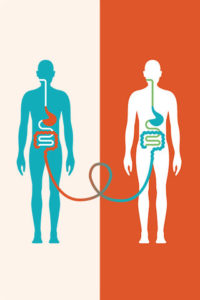There is new research on the relation between autism and gut bacteria leading to potential new treatments to improve the lives of those affected by the condition. Autism is a condition with a broad range of symptoms. These include issues developing with social skills, repetitive behaviors, speech and understanding and using nonverbal communication. With an apparent rise in cases diagnosed each year, currently one in 59, up from one in 150 in 2000, researchers are looking for way to explore and treat this disorder.
Of particular concern is how unprepared the United States is for the increased amount of cases. There have been many theories proposed as to the cause of the disorder, but nothing is certain as of yet. Part of the problem is that researchers do not completely understand the condition. One theory suggests genetics as the predominant factor, while others say it may be associated with conditions which are known to cause birth defects. Childhood immunizations have also been proposed. There is, however, no scientific evidence childhood immunizations cause autism.
There are a great deal of treatments for this condition, though there is no cure. Anger therapy, family therapy and behavior therapy are conducted to help family and patients cope and grow despite the condition. Anti-psychotics are prescribed in some cases. Certain specialists such as an occupation therapist can help a patient improve their day to day functions. There are also dietary and nutritional strategies and methods being employed with results. Unfortunately, there is no treatment to handle to
core symptoms which include social communication difficulties and repetitive behaviors.
A new study out of Arizona State University looks at gut microbiome. Gut microbiome is a collection of microbes living in the intestines which helps the human body digest food, train the immune system in its continued defense and prevent harmful bacteria from overgrowing. Recent research is suggesting a link between gut bacteria, brain communication and neurological symptoms and this study explores that theory further. Scientists are discovering a link between the microbes in the intestines and the communications within the brain and scientists involved in this research are much
more convinced of this.

Fecal transplantation may benefit autism symptoms by honing in on the gut-brain connection.
Many of the patients already had gastrointestinal issues and researchers note when those are treated, an autistic child’s behavior will improve. Interestingly, about 30-50% of autistic individuals have some kind of chronic gastrointestinal problems. These include constipation and/or diarrhea, conditions which can last for years. This chronic condition and the pain it causes will cause the child to be irritable, be less attentive in school and have behavior issues.
Scientists have noted children with autism lack certain kinds of bacteria which are critical in their development One study used vancomycin, an antibiotic, and while it showed improvements in autistic symptoms and gastrointestinal issues, these were only temporary, disappearing after a few weeks.
The study demonstrates long-term beneficial effects for children diagnosed with autism in a new technique known as Microbiota Transfer Therapy (MTT). MTT uses a special type of fecal transplant. Remarkably, improvements in gut health and autism symptoms appear to persist long after treatment. The process includes 10 weeks of treatment, including pre-treatment with vancomycin, a bowel cleanse, a stomach acid suppressant, and fecal microbiota transfer every day for seven to eight weeks.
Patients showed signs of gastrointestinal issues in infancy, including chronic constipation and/or chronic diarrhea. Many of the patients had common traits, including birth by C section, reduced breastfeeding, increased antibiotics, and low fiber intake by the mother and child. These traits can lead to limited biodiversity in their gut bacteria. Results were promising according to researchers. At the two year follow-up two positive results in particular were noted.
First, positive changes in the guts of the patients remained. Secondly, there
was a notable change, improvement in autism symptoms. Quantitatively speaking there was 45% reduction in autism symptoms, particularly in language, social interaction and behavior. Researchers are aware of the potential of a placebo affect, but they are convinced the efforts here are baring real fruits and there is potential for more development and progress.
When the study began, 83% of patients were designated as ‘severe’ autism. But, by the end, only 17% were ‘severe’ while 39% were ‘mild’ and 44% were below the cut-off point for autism. Researchers noted a small sample of patients were used for this research. In order to get more in-depth results, more research has to be conducted.


